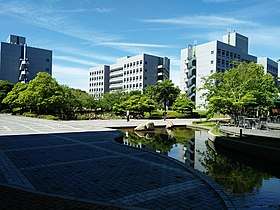Nara Institute of Science and Technology
Nara Institute of Science and Technology (奈良先端科学技術大学院大学, Nara Sentan Kagaku Gijutsu Daigakuin Daigaku), abbreviated as NAIST, is a Japanese national university located in Ikoma, Nara of Kansai Science City. It was founded in 1991 with a focus on research and consists solely of graduate schools in three integrated areas: Biological Sciences, Information Sciences, and Material Sciences. NAIST is one of the most prestigious research institutions in Japan.
奈良先端科学技術大学院大学 | |
 | |
| Type | Public (National) |
|---|---|
| Established | October, 1991 |
| Endowment | US$-- billion (JP¥-- billion) |
| President | Naokazu Yokoya (Japanese: 横矢 直和) |
Administrative staff | 374 |
| Postgraduates | 1,043 |
| Location | , , |
| Campus | Suburban, 139,967 m² |
| Mascot | None |
| Website | www.naist.jp |
In the "Evaluation of Achievements Related to the 2nd Medium-term Goals and Plans" (2010-2015)conducted by the Japanese government for national universities, NAIST was evaluated as exceedingly superior especially concerning research levels. (One of 5 institutions from the 86 national universities).[1] In 2010, NAIST ranked first overall among the 86 Japanese national universities by the Japanese government in its first-ever six-year (2005-2010)assessment of national university standards and achievements.[2]
The university has a total of about 1,000 Master's and Doctoral students in its three graduate schools (2010),[3] among which more than 20% are international students (2017).[4] There are about 200 faculty members and 170 staff (2010).[5]
In 2018, NAIST underwent an organizational transformation to continue research in these areas while promoting interdisciplinary research and education across traditional fields. With this new single graduate school organization, NAIST strives forward with the objectives of conducting cutting-edge research in frontier areas and training students to become tomorrow's leaders in science and technology.[6]
History
NAIST was founded in 1991 with the establishment of the Graduate School of Information Science and the University Library, followed by the Graduate School of Biological Sciences the next year. The first master's students were admitted in 1993, and doctoral students were first admitted in 1996, which is also the year the Graduate School of Materials Science was established. The establishment of the Venture Business Laboratory and the Intellectual Property Division in 2003 furthered the university's drive to utilize research results to secure patents and licenses, and form new businesses. In 2004, along with all of Japan's national universities, NAIST became an independent university corporation.
- 1991: Establishment of the Nara Institute of Science and Technology, including the Graduate School of Information Science and University Library
- 1992: Establishment of the Graduate School of Biological Sciences
- 1993: Establishment of the Research and Education Center for Genetic Information
- 1994: Establishment of the Research Center for Advanced Science and Technology
- 1996: Establishment of the Graduate School of Materials Science
- 1998: Establishment of the Research and Education Center for Materials Science
- 2003: Establishment of the Venture Business laboratory
- April 2011: Establishment of Department of Information Science, Graduate School of Information Science | Establishment of Department of Biological Sciences, Graduate School of Biological Sciences
- April 2013: Establishment of Career Services Office
- April 2015: Establishment of Center for Strategy and Planning established | Establishment of Institute for Educational Initiatives | Establishment of Institute for Research Initiatives| Closing of Center for International Relations | Closing of Institute of Research Initiatives
- April 2017: Establishment of Data Science Center
- April 2018: Department of Science and Technology, Graduate School of Science and Technology established and students accepted (The merging of the Graduate School of Information Science, Graduate School of Biological Sciences and the Graduate School of Materials Science)
Organization
Graduate schools (After 2018)
From April 2018, the past three graduate schools (Graduate School of Information Sciences, Graduate School of Biological Sciences, Graduate School of Materials Science) were integrated into one research department, Graduate School of Science and Technology.
Graduate schools (Before 2017)
- Graduate School of Biological Sciences [7]
- Division of Plant Biology
- Division of Biomedical Science
- Division of Systems Biology
- Plant Global Education Project
- Global COE Program Special Research Group
- Graduate School of Information Science [8]
- Division of Computer Science
- Division of Media Informatics
- Division of Applied Informatics
- Graduate School of Materials Science [9]
Centers and facilities
Notable research
Notable researchers
- Shinya Yamanaka - Former professor, 2012 Nobel Prize for Physiology or Medicine winner
Gallery
 NAIST gate
NAIST gate NAIST Student dormitory
NAIST Student dormitory Gate of NAIST
Gate of NAIST Sentan guest house
Sentan guest house NAIST library
NAIST library Plant lab
Plant lab Information science building
Information science building Convenience store in NAIST
Convenience store in NAIST NAIST in spring
NAIST in spring
Notes and references
- 2017/12/21, Asahi Shimbun, front page cited on NAIST official web site
- 2010/03/25, Asahi Shimbun, front page cited on NAIST official web site
- Number of Students on NAIST official website accessed at Oct 10, 2012
- Number of International Students on NAIST official website accessed at Oct 10, 2012
- Number of Faculty on NAIST official website accessed at Oct 10, 2012
- "About NAIST|NARA Institute of Science and Technology". www.naist.jp. Retrieved 2019-01-28.
- "TOP - NAIST-GSBS". Retrieved 29 July 2016.
- "NAIST Graduate School of Information Science". Retrieved 29 July 2016.
- NAIST Graduate School of Materials Science Homepage
- "NAIST Division for Industry-Government-Academia Collaboration". Retrieved 29 July 2016.
- "DGE". Retrieved 29 July 2016.
External links
| Wikimedia Commons has media related to Nara Institute of Science and Technology. |